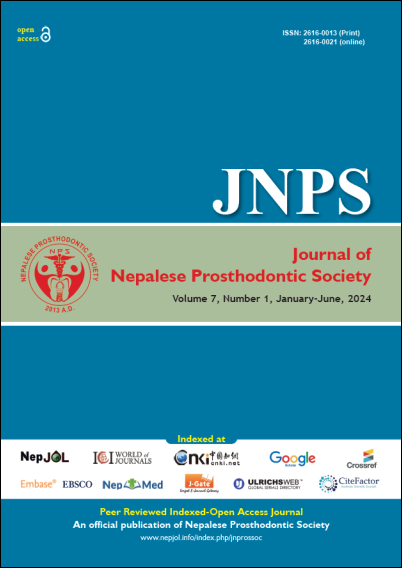Fear and Practice Modifications among Nepalese Prosthodontists during COVID-19 Outbreak
DOI:
https://doi.org/10.3126/jnprossoc.v7i1.70420Keywords:
COVID, Dental practice, Fear, ProsthodontistsAbstract
Introduction: The COVID-19 pandemic poses significant risks to healthcare professionals, including dental specialists such as prosthodontists. Prosthodontists face unique challenges due to their close contact with patients and the nature of their procedures, which often involve multiple visits and exposure to saliva, blood, and aerosols. This study aims to assess the anxiety and fear experienced by prosthodontists in Nepal and evaluate their knowledge of practice modifications to mitigate COVID-19
risks.
Methods: A hospital-based descriptive cross-sectional study was conducted from September 15 to October 15, 2020. Self-administered questionnaires were distributed online to registered prosthodontists in Nepal. The survey included 33 closed-ended questions divided into two sections: socio-demographic characteristics and fear/anxiety assessment, and practice modifications. Responses were collected via Google Forms and analyzed using the Statistical Package for Social Sciences (SPSS version 25).
Results: The study included 73 participants from various provinces and work settings. The majority (90.4%) were within the age group of 30-60 years, with a nearly equal gender distribution. Most prosthodontists (61.6%) expressed fear of transmitting the virus to their families, and 39.7% felt anxious when treating patients with potential COVID-19 symptoms. More than half (54.8%) had not resumed regular prosthodontic practice, although 87.7% provided emergency care. High adherence to safety protocols was noted, although gaps existed in the use of disposable equipment and single-use items.
Conclusions: The findings highlight significant anxiety and fear among prosthodontists in Nepal due to COVID-19, emphasizing the need for continued education and support. Adherence to updated guidelines, enhanced safety protocols and psychological support can help alleviate apprehensions and improve the overall practice environment.
Downloads
Downloads
Published
How to Cite
Issue
Section
License
Copyright (c) 2024 The Author(s)

This work is licensed under a Creative Commons Attribution-NonCommercial-NoDerivatives 4.0 International License.
This license enables reusers to distribute, remix, adapt, and build upon the material in any medium or format, so long as attribution is given to the creator. The license allows for commercial use. © The authors




